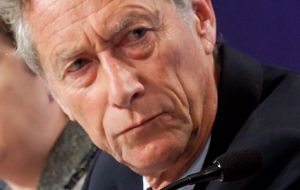MercoPress. South Atlantic News Agency
IMF calls for financial markets to be monitored by political supervision
 “We must also look at the stability of the financial system” Blanchard was quoted
“We must also look at the stability of the financial system” Blanchard was quoted Central banks should be independent in setting monetary policy but they should also be tasked with monitoring financial market stability under political supervision, the International Monetary Fund's (IMF) chief economist said.
Olivier Blanchard also told Handelsblatt newspaper's Friday edition that Germany should take on a stronger role in Europe and needed to invest more rather than focus on saving.
“If there is one lesson to be learned from the crisis, it must be: it's not enough to keep an eye on monetary stability. We must also look at the stability of the financial system,” Blanchard was quoted as saying.
”(Central bank) independence should be tiered. Classical monetary policy must remain independent. The control of the financial markets by the central bank, however, should be put under some kind of political supervision.”
Blanchard reiterated his call to raise inflation targets to 4% from the current roughly 2%, saying that would create space to cut interest rates during crises. The European Central Bank (ECB) should consider ways to lower credit costs for small and medium enterprises.
Blanchard said he was concerned that European countries would drag their feet on structural reforms as confidence grew that the worst was over in the euro zone sovereign debt crisis.
“You hear it more and more: 'we have reformed enough, now we are seeing results. Spare us new demands'. That worries me,” he said. “We need further structural reforms if we want to reach an acceptable level of employment. Even Germany, which is not going through a jobs crisis, is not exactly growing impressively.”
He said Germany, the euro zone's largest economy, should see Europe more as an insurance scheme than a transfer system and many wished Germany would take a stronger role in Europe.
“Sometimes the fire is at your neighbour's house; sometimes it's in your own house. I wish the focus was more on the question: how can we strengthen the Euro?” Blanchard said, adding that meant banking union should be completed.
Blanchard did not rule out further debt relief for Greece, the country where the Euro zone crisis first broke out.
“The IMF has agreed with the Europeans that the debt level will be below 110%of GDP in 2022,” he said. “We will have to see how we will get there.”




Top Comments
Disclaimer & comment rulesCommenting for this story is now closed.
If you have a Facebook account, become a fan and comment on our Facebook Page!